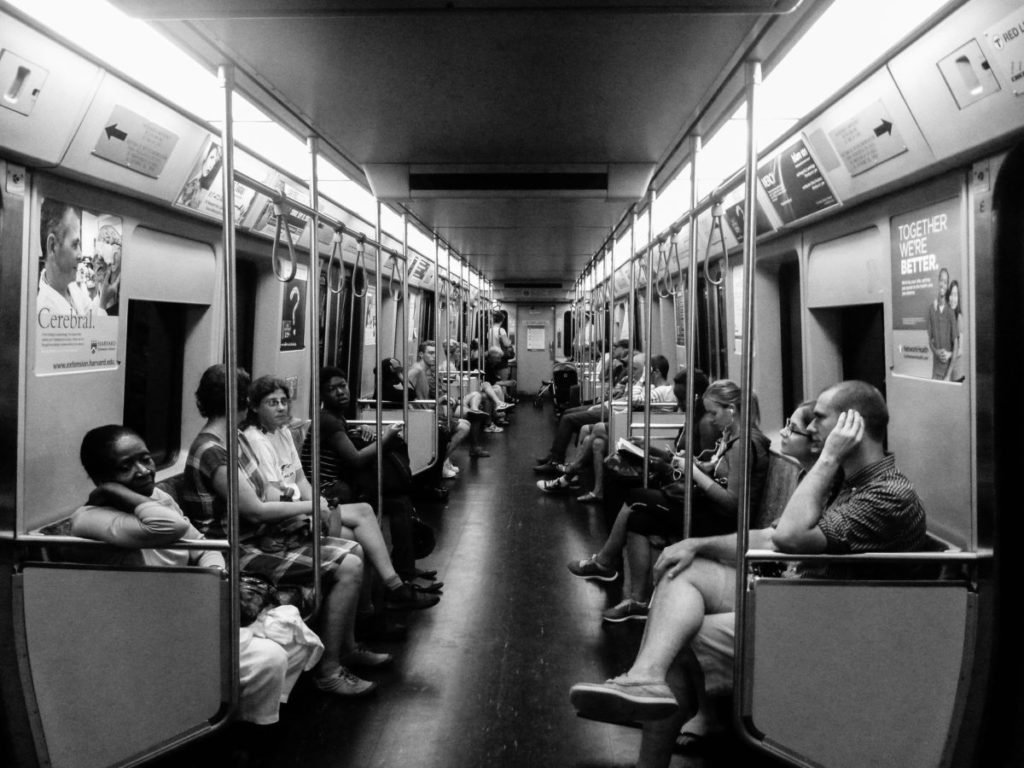I would describe what I witnessed that day as a meeting of the mundane and the spiritual. I was a young man living in Boston, Mass., in the late 1970s, when I saw something that made an indelible impression on me. It was one unexpected gesture made by someone from whom I should have expected it, but I might have been too jaded. Besides, at the time, I was preoccupied by my own disquiet at seeing another’s ill fortune.
The Massachusetts Bay Transportation Authority, locally known as “the T,” still deploys four color-designated rail lines. On that day, I was traveling south on the Red Line, which emerged from the subway tunnel and extended for several miles as an elevated train. At one stop, a man who was perhaps in his thirties entered our car and immediately sat in the nearest seat, which was next to the door on that side, facing the door on the opposite side next to which I sat. While most seats were arranged so that they faced the direction of travel, the seating next to the doors were parallel to the walls of the car so that the new passenger was essentially facing me.
The man made an immediate impression because his face and hands were marked by lesions. He wore a long-sleeved shirt so that I could only imagine whether this abnormal tissue covered his whole body. The striking thing about my memory is that I cannot call up a precise image of his appearance. I remember that the lesions were raised on his skin and that they were discolored, but what color they were exactly, I cannot recall. I found myself not wanting to look at him but unable to entirely look away. While my reaction was in part due to common courtesy (“Don’t stare at people,” I had been told when I was a child), it was predominantly a visceral fear. All of the clichés applied: “There but for the grace of God, go I.” “Don’t look at him; that might be how you catch it!”
Along with my own reaction, I had an almost palpable sense that nearly every other passenger in our car was feeling the exact same thing that I was. It was one of those atmospheric effects that hang in the air and that people say can be cut with a knife. Nobody wanted to look at the man and yet nobody could look away.
The man himself sat on the edge of his seat, eyes downcast, not focused on anything or anyone in particular. He must have been aware of the impression he made, must have been used to it by now, without ever being used to being an object of horror, a walking warning against whatever it was that he had done to bring this upon himself. And that was the other shoe that could only keep falling without ever hitting the ground: What disease did the man have and how did he get it? Those in the car who had some medical knowledge could have been in a better position to know than I was, but the thought came unbidden to me that this man might be in an advanced stage of syphilis. I could easily interpret his implacable sad-eyed quiescence as shame.
Neither the man nor the rest of us moved until the following stop. Then a number of passengers got off the train, passing out through the door next to his seat, seeming to hurry, or at least that was my impression. It was not my stop, and I had a way yet to go. So I sat, outwardly without moving. No one spoke.
At the next stop, only a couple of passengers got off, but one of them caught my attention as he crossed my field of vision, moving slowly and deliberately toward the door. He was a stocky gray-haired man in a dark suit. It was only in the last seconds of the vignette that played out before me that I registered that this exiting passenger had on a priest’s collar.

As the priest passed by the afflicted man, he reached out and gently but firmly placed a hand on the man’s shoulder. It was done discreetly, in passing, but it was an unmistakable gesture of compassion. Then the priest stepped onto the platform, and the doors closed behind him. Outwardly, the afflicted man showed no response to it. He kept still. There seemed no telling whether or not he felt any better because of the priest’s gesture. Why should he? He was still a man living with an alarming affliction.
Yet I was left to reflect on what the priest had done and what I had not done. I reflected on my less than noble reaction to the afflicted him and felt my own shame. But I also felt powerless because I could hardly bring myself to match the priest’s compassionate gesture. When my stop came, I left the train without any gesture toward the man, but I neither hurried by him nor distanced myself from him. This was not much better than before, especially outwardly, but I felt differently, a combination of regret and hope. Regret that I could not do as much and hope because I had witnessed someone who actually could. And I wanted to think that the atmosphere in the car I was leaving had changed for the better, too.

Share this post with your friends.

